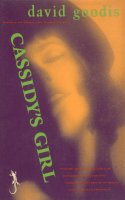By Bill Sherman
from Sight and Sound, 1968/1969
Ed Petit on Goodis Titles. YouTube by Duane Swierczynski
On January 7, 1967, David Goodis died in Philadelphia where he had lived most of his life. Only one source bothered to print more than a cursory obituary. The Philadelphia Inquirer, in a one-column notice, said that Goodis had directed a film titled "Please Don't Shoot the Piano Player": The newspaper went on to say that "his best-selling novel, Cassidy's Girl, sold over one million copies." But Cassidy's Girl, like so much of Goodis' work, was a semi-hack job sold in New York's 42nd Street book stores specializing in hard-core pornography. In a letter to me dated August 16, 1966, David Goodis wrote:
"At first I wanted to write very solemnly and handle only the important issues. But I quickly found that the most important issue was putting food in one's belly, and in order to do that I deviated from the track most of the time and compelled with the wishes of the various editors and publishers. I admit this was a weakness. I should have taken a job digging ditches, and because I was too lazy to do that, I threw away a lot of valuable time, especially in Hollywood; although I must say I had a lot of fun in Hollywood."



Before he died, Goodis wrote sixteen published novels, some short fiction, and several screenplays.* All of his work including Down There, which Truffaut filmed as Tirez sur le Pianiste, is now out of print. There are only two changes which Truffaut made from the novel. The first is the invention of the pianist's younger brother. In the film it is the act of kidnapping the boy which leads to the final act of commitment. The second is that at the end of the film, there is a new waitress at the club, a surrogate for the girl killed by the gangsters. The implication of course is that the pianist may yet again be drawn into a love-relationship. These two changes underscore the fact that the novel is considerably more fatalistic and bleak than the film. The greatness of the Truffaut film is unquestionable, but Down There offers the same shifting blend of comedy, pathos, and tragedy. The book, like the film, bursts through the conventions of its genre.
Goodis' first novel, Retreat from Oblivion, was published in 1939 when the author was twenty-two years old, a recent graduate of Temple University in Philadelphia. I each work since that time, even in his worst hack jobs, there are moments when his great talent struggles to break through. All of Goodis' novels are set in cities, and his heroes all possess the wiles and cunning a man of the city needs to survive. All of his major characters are drop-outs, either by choice or circumstance, from society. They are criminals, petty thieves, ghetto dwellers, winos, meth-freaks, bums, addicts, whores. Whether they in in San Francisco, New York, Kingston, or (as most often they do) in Philadelphia, Goodis pays strict attention to topography. He roots the movements of his characters in a ruthless exactitude of place.
The only glimmer of hope in the lives of his characters is the possibility of love. All of his heroes, no matter how degenerate, are blessed (or cursed) with women who try to redeem their lives. Sometimes the attempt at redemption falls (as in Down There) and leads instead to a kind of madness. Sometimes (as in Cassidy's Girl), it leads to a renewed opportunity. Most often, it is left ambiguous whether or not the love affair will be consummated, for more than a transient moment. In Dark Passage, a novel which is typical in that it falls midway between the high level of accomplishment of Down There and the hack-work of Cassidy's Girl, the hero, on the run from the police, asks his lover to meet him in Peru. Whether she will is problemmatical. But always Goodis asserts that love is the only value in an absurd universe, a world where comedy intrudes in moments of tragedy and disaster lurks beneath the surface in the happiest of times.
Goodis' work anticipated the current vogue for black humour, but there was a touch of Dashiell Hammett and Raymond Chandler in him, and a bit of the 'proletarian writer' of the 1930s. Yet his novels confound classification, which is how it should be. The point is, quite simply, that in a time when a writer's literary stock in the United States seems often to depend on a literary agent and a public relations officer, there was an unheralded artist living alone and destitute and physically ill in Philadelphia. His works gave me pleasure.
--WILLIAM DAVID SHERMAN
-----------------
* His credits: 1947 THE UNFAITHFUL (Directed by Vincent Sherman; script by D.G. and James Gunn)
1947 DARK PASSAGE (directed and scripted by Delmer Daves from the novel by D.G.)
1956 NIGHT FALL (directed by Jacques Tourneur; scripted by Stirling Silliphant from D.G.'s novel.)
1957 THE BURGLAR (Directed by Paul Wendkos; scripted by D.G. from his own novel.)
.


